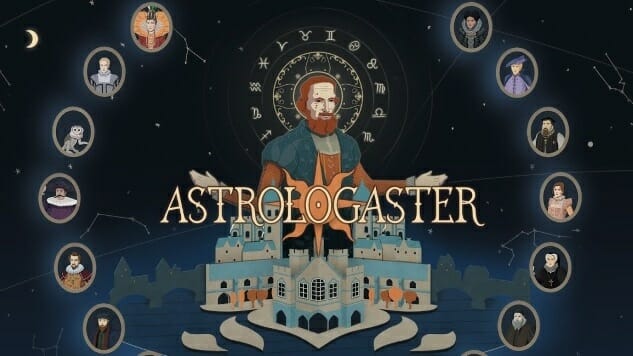
Astrologaster is, to borrow a word from one of its many historical Elizabethan characters, a perfectly wicked game. It is an acerbic but mischievous look at the golden age of English rule, set during a time when religion and mysticism played a (deadly) role in medical science. Enter Simon Forman, a would-be doctor and physick (inspired by the real man, who lived from the late 1500s to early 1600s) who doesn’t have a degree from the University of Cambridge but is determined to practice medicine anyway. To get the eight letters of recommendation needed to secure his medical license, he sees patients for problems both physical and emotional, diagnosing their illnesses by divining them from the stars. It is a game not defined by chance but intuitive guesswork; players must choose responses that are represented by constellations and planetary alignments that make little sense to the untrained eye and are often incorrect anyway. The confusion is by design, of course; the limited understanding of science in the Tudor era made medicine more of a matter of luck than skill, and the ambiguity at the heart of the game’s mechanics makes that point beautifully. But better than that, Astrologaster is a game about imperfect historical figures, and it makes no secret of its contempt.
When I say that Astrologaster doesn’t take any shit, I mean that it doesn’t bother trying to make me like Simon Forman, or much of anyone in the game, really. When the brilliant choral interludes preceding each scene or the banter of each examination aren’t wittily making fools of men, they’re often instead taking pot shots at Christianity, or rather, the hypocrisy of organized religion and tedious nature of dogma. Many characters are scheming, sexist, spiteful, greedy, immature, or just plain delusional, and the game isn’t afraid to tell us so. Or show us, through the storylines that rise out of each person’s significant personal flaws, whether it’s the Earl of Essex stealing Her Majesty’s ships in a vain quest for New World gold, or William Shakespeare himself committing theft and sabotage against a female co-author. Feel free to hate almost everyone in Astrologaster, because you absolutely should.
Simon Forman, meanwhile, is nakedly contemptible, committing a veritable smorgasbord of sins as the physician of Lambreth: he puts lives at risk with his lack of medical training, takes advantage of private information to gain advantage over his patients, carries on affairs with those who seek his consult, and even stalks some of the women he meets in his office. In one case, his jealousy may have even caused his lover’s death. But Astrologaster also does not ask you to look the other way; if anything, the ladies in his life really let him have it, righteously laying into him on several occasions. And his ultimate fate, even if the game ends with his successful acquisition of a medical license, is also far from redemptive; despite having cured an outbreak some years before, he winds up a victim of his own patients, nailed shut in his house during another bout of the plague. (His reputation is posthumously tarnished further after being implicated in a plot to murder by poison). The game’s message is very clear: make no mistake, if you’ve romanticized this era as being filled with “good people,” “decent human beings” who didn’t engage in every form of pettiness known to man, you were mistaken. Vice is not a new invention.
I’ve only played through the game once, so I’m not actually sure exactly how many characters, story branches or endings there are. I was able to secure Forman’s medical license by obtaining all eight letters of recommendation, and at that point, the game abruptly ended. But I may play again just to see what other interactions pop up. As someone who grew up in a patriarchal and separatist sect of Christianity, I find the honesty of this game so refreshing. So often we’re asked to hold the past in high regard and ignore that many of its greatest contributors were terrible people. The lack of acknowledgment sometimes feels as though society has decided that human suffering is acceptable collateral damage. Even the slightest resistance to that idea can be very comforting.
It’s fitting that Astrologaster is based on the stars, because frankly it’s a gas. It exhibits a merciless wit that is immensely effective in dismantling the romanticism and historical revisionism that often accompanies period pieces. But more importantly, it doesn’t seem too impressed—with the Church, with so-called literary greats, or with men, and in that sense, I identify with it a lot. Astrologaster takes no shit, but it doesn’t give any either. And that’s what makes it perfect.
Astrologaster is available on PC, Mac and iOS devices.
Holly Green is the assistant editor of Paste Games and a reporter and semiprofessional photographer. She is also the author of Fry Scores: An Unofficial Guide To Video Game Grub. You can find her work at Gamasutra, Polygon, Unwinnable, and other videogame news publications.
